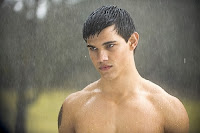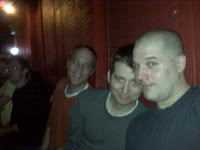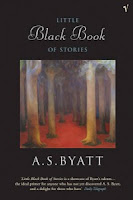 Oh, be ready to throw the tomatoes at me, yes, I spent hard-earned money to go see New Moon for our Undeath Match. Luckily, I was accompanied by someone (Rachel) who both saw the cheese potential (so bad it’s good) and has a similar penchant for some good, old girlie fun. But, wow, is this film ever bad.
Oh, be ready to throw the tomatoes at me, yes, I spent hard-earned money to go see New Moon for our Undeath Match. Luckily, I was accompanied by someone (Rachel) who both saw the cheese potential (so bad it’s good) and has a similar penchant for some good, old girlie fun. But, wow, is this film ever bad.
Like, really, really bad.
Shame on you EW for giving it a B+. And shame on all you CinemaScore peeps for coming out of the film and handing over an average of A-.
For anyone living under a rock, a soppy teenage girl (Bella Swan, what a stupid name) is abandoned by her mother (awesome role model there) who got remarried and shipped her off to Forks, WA to be reared by her silent but sturdy father (town sheriff, natch), falls in love with a “smoldering” perma-teenage vampire (Edward Cullen). They swoon. They stare into one another’s eyes. And by the end of Twilight, they were actually an honest to goodness couple — chaste even by Mormon standards — but a couple nonetheless. Enter New Moon and all the horrible metaphors that title implies.
Open Scene: It’s Bella’s birthday. Of course, no one’s allowed to give her presents (because teenage girls just HATE stuff), and no one listens to her. Yawn. There’s a party at the Cullen Manor and she gets a paper cut. Oh, the blood! It’s so hard for the vampires to resist. Why? Because they’re vampires, that’s what they do, they suck the blood. Yawn. Edward decides that it’s over, for Bella’s own good. Because Bella, for the love of Pete, has no mind of her own. He leaves. She dies inside and suffers from an almost life-ending depression coupled with sweat-stained, sheet-scrunching nightmares.
Enter buffed up buddy Jacob who glides in with the cheesiest wig to end all wigs and abs to rival Tim Riggins. He’s the only one who can pull Bella out of her post-Edward coma. They build motorcycles together because she needs to live on the “edge.” Why? Oh, because that’s when Spectral Edward shows up to tell her what to do. Again, why? Because Bella has no brain nor mind of her own. Quadruple yawn. Oh, and Jacob’s a werewolf. Did I forget to mention that? Because all of her boyfriends are supernatural. She’s just that special.
Jake and Bella bond. He wants more but there’s a treaty in play, blah vampires versus werewolves, blah de blah. Edward moan, groan, moan. And I’m already tired of recapping the plot so let me just cut to a list of why this movie sucked so much I would have walked out if I was there by myself:
1. Why can’t teenagers have fun? Even a little? Why are they always pouting and acting all angrily and not doing anything remotely like regular kids?
2. Seriously, shut up Edward.
3. Bella stands in a meadow (even though a terrible red-headed vampire named Victoria is hunting her) alone as a dread-locked vamp says, “I’m going to kill you, okay?” She sort of shrugs and doesn’t move. Let’s repeat that, she does NOT MOVE. She just waits for Edward to come and save her but because he’s convinced being together would put her in too much danger, he’s nowhere to be found. Wha? Run little girl, run. Fight, kick, scream, just do something other than pout cross-eyed at the damn man.
4. Again, even when he’s not on screen I want Edward to shut up. Spectral Edward should have a sock shoved in his fog-inducing ass.
5. What happened to quality role models for girls? Where’s Judy Blume when you need her? Where’s Nancy Drew or Andie or Jo? Bella mopes around because of a boy, abandons her friends, who don’t even say WTF when she decides to start talking to them again, abandons both school and her parents to run off at the very slight chance she’ll even see Edward, and only acts when it relates to a boy (Edward or Jacob). She is consistently needing to be saved. She never, ever saves herself. And when they both say, “oh we can’t be together because you might get hurt or I might hurt you,” she curls up into a little ball and does a fat lot of nothing.
6. So, the whole wolf pack runs around with no shirts and cut-off pants. But when they change, what happens to the pants? The werewolves aren’t wearing them and they’re not flopping around anywhere on the ground. They magically disappear and then magically appear when they turn back. Those are some magical pants. Who cares about continuity when you have Taylor Lautner’s abs?
7. Shut up Edward.
8. If Bella’s dad’s supposed to be a cop, and a good cop at that, how come he never notices a) her boyfriends all have freaky eyes and often walk around all the time without shirts and b) that they’re supernatural? Hasn’t he lived in Forks his entire life and isn’t one of his closest friends a Native American?
9. The first movie sucked, but at least there was a cheese factor that made it kind of hilarious. That first moment when Edward sparkles, priceless. Here, they’re all dour and angry — pushing and pulling each other with no payoff.
10. The whole Team This or Team That is just dumb. Even though Edward got his ass kicked by the strange Michael Sheen headed cult thingy, Bella’s so obviously in love with him (and if you’ve read the spoilers and/or the books) you know what happens. In fact, it doesn’t matter what happens because it’s all filler anyway — it’s a road block in between the happy ending. The story’s been told a million times. However, IF I were to pick a side (and no serious, book-loving, 30-something woman has any right to even be talking about this), I’d have to go with Jacob. I know he has no chance but, let’s face it, Edward got his pasty-emo handed right back to him in that (SPOILER) battle toward the end, and rightly so. The werewolves, as goofy as they are running around the forest in basically their underwear, can truly fight. That was the best part of the film, actually. The wolves battling it out and ripping the heads of the vampires. Pretty, pretty awesome. But don’t tell Kimberly I said that.
11. SHUT UP, Edward.
I’ve been reading Twilight and I doubt I’ll review it here — what can I possibly say. Everyone knows the writing is horrible. It’s akin to the worst stuff I’ve ever read in some of the worst creative writing classes I’ve attended. She tells way more than she shows, Meyer has never met a useless, moronic detail she didn’t like, and, other than the setting, which I quite like, she breaks taboos that undermine the merit (if any) of her work. The struggle to be good, to be in love, all that good, juicy teenage stuff makes for good ingredients but what she cooks up couldn’t be any more contrived if she tried. And yet, she’s sold millions and millions of books. Let’s just hope she’s using some of her royalties for good and re-planting some of the trees she’s destroyed over the years. It’s like Stephen King pointed out, at least J.K. Rowling can write, you know?
 There’s not a single stitch of doubt in my mind that I’m a sentimental girl. I have a few movies that I watch over and over again when I get that girlish need for imagined romance. Tully, Before Sunset, Say Anything — you know, those kind of films. The ones that get under your skin more and more after each repeated viewing. The ones you never get tired of, that you find kind of inspiring regardless of the odd cliche thrown in here and there. Well, (500) Days of Summer has just been added to the aforementioned list.
There’s not a single stitch of doubt in my mind that I’m a sentimental girl. I have a few movies that I watch over and over again when I get that girlish need for imagined romance. Tully, Before Sunset, Say Anything — you know, those kind of films. The ones that get under your skin more and more after each repeated viewing. The ones you never get tired of, that you find kind of inspiring regardless of the odd cliche thrown in here and there. Well, (500) Days of Summer has just been added to the aforementioned list.









